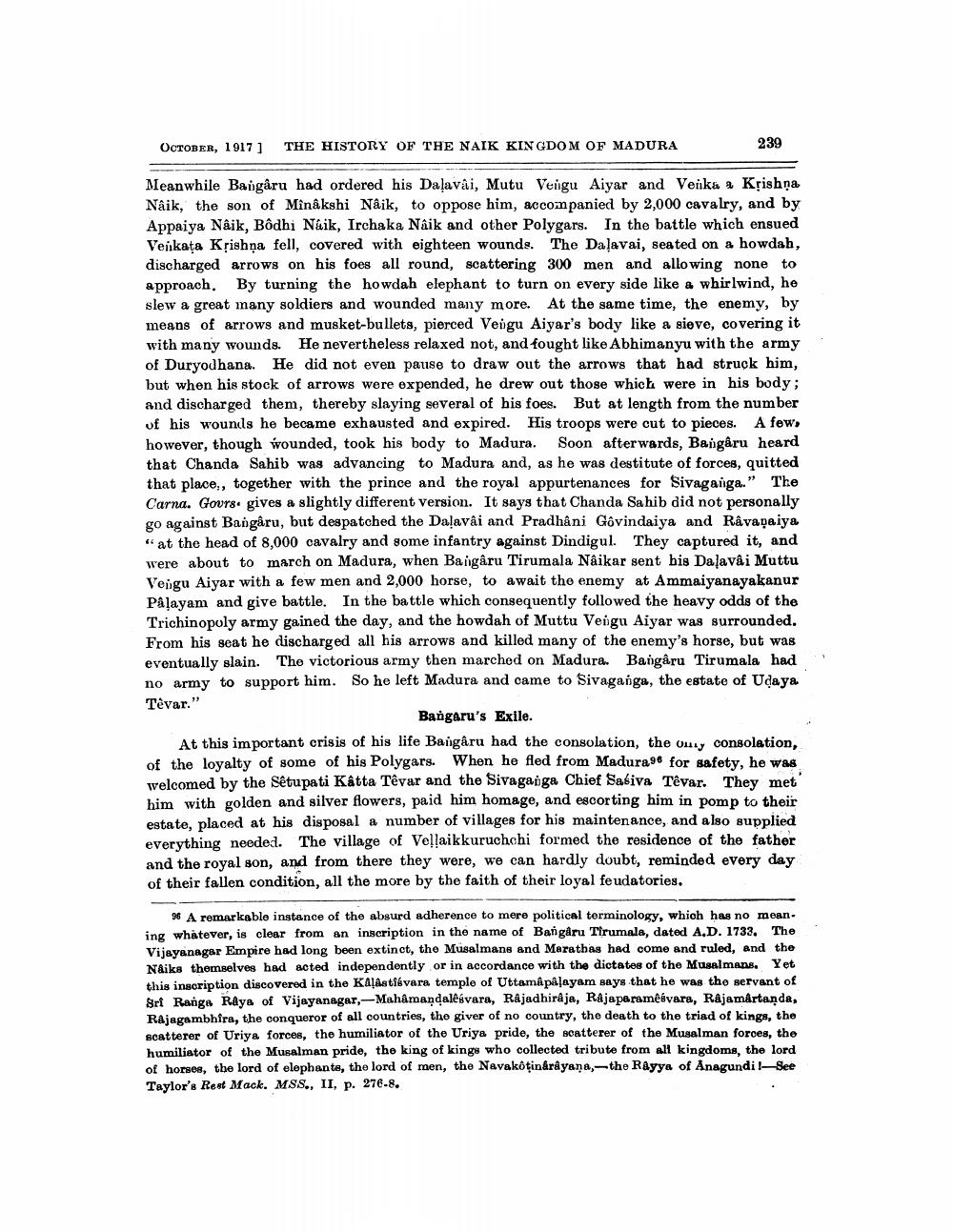________________
OCTOBER, 1917]
THE HISTORY OF THE NAIK KINGDOM OF MADURA
239
Meanwhile Baigâru had ordered his Dalavai, Mutu Vengu Aiyar and Venka Krishna Naik, the son of Minakshi Naik, to oppose him, accompanied by 2,000 cavalry, and by Appaiya Naik, Bôdhi Naik, Irchaka Naik and other Polygars. In the battle which ensued Veikata Krishna fell, covered with eighteen wounds. The Daļavai, seated on a howdah, discharged arrows on his foes all round, scattering 300 men and allowing none to approach. By turning the howdah elephant to turn on every side like a whirlwind, he slew a great many soldiers and wounded many more. At the same time, the enemy, by means of arrows and musket-bullets, pierced Veigu Aiyar's body like a sieve, covering it with many wounds. He nevertheless relaxed not, and fought like Abhimanyu with the army of Duryodhana. He did not even pause to draw out the arrows that had struck him, but when his stock of arrows were expended, he drew out those which were in his body; and discharged them, thereby slaying several of his foes. But at length from the number of his wounds he became exhausted and expired. His troops were cut to pieces. A few however, though wounded, took his body to Madura. Soon afterwards, Bangaru heard that Chanda Sahib was advancing to Madura and, as he was destitute of forces, quitted that place, together with the prince and the royal appurtenances for Sivaganga." The Carna. Govrs« gives a slightly different version. It says that Chanda Sahib did not personally go against Bangaru, but despatched the Dalavâi and Pradhani Gôvindaiya and Råvapaiya "at the head of 8,000 cavalry and some infantry against Dindigul. They captured it, and were about to march on Madura, when Bangaru Tirumala Näikar sent his Daļava i Muttu Veigu Aiyar with a few men and 2,000 horse, to await the enemy at Ammaiyanayakanur Palayam and give battle. In the battle which consequently followed the heavy odds of the Trichinopoly army gained the day, and the howdah of Muttu Veigu Aiyar was surrounded. From his seat he discharged all his arrows and killed many of the enemy's horse, but was eventually slain. The victorious army then marched on Madura. Bangâru Tirumala had no army to support him. So he left Madura and came to Sivaganga, the estate of Udaya Têvar."
Bangaru's Exile. At this important crisis of his life Bangāru had the consolation, the my consolation, of the loyalty of some of his Polygars. When he fled from Madura96 for safety, he was welcomed by the Setupati Katta Têvar and the Sivaganga Chief Sabiva Têvar. They met him with golden and silver flowers, paid him homage, and escorting him in pomp to their estate, placed at his disposal a number of villages for his maintenance, and also supplied everything needed. The village of Vellaikkuruchchi formed the residence of the father and the royal son, and from there they were, we can hardly doubt, reminded every day of their fallen condition, all the more by the faith of their loyal feudatories.
96 A remarkable instance of the absurd adherence to mere political terminology, which has no mean. ing whatever, is clear from an inscription in the name of Bangaru Tirumala, dated A.D. 1733. The Vijayanagar Empire had long been extinct, the Musalmane and Marathas had come and ruled, and the NAiks themselves had acted independently or in accordance with the dictates of the Musalmana, Yet this insoription discovered in the Kaļastisvara temple of Uttamâ palayam says that he was the servant of Sri Ranga Raya of Vijayanagar,-Mahamandalesvara, Rajadhiraja, Rajaparamêsvara, Rajamartanda, Rajagambhira, the conqueror of all countries, the giver of no country, the death to the triad of kings, the scatterer of Uriya forces, the humiliator of the Uriya pride, the scatterer of the Musalman foroes, the humiliator of the Musalman pride, the king of kings who collected tribute from all kingdoms, the lord of horses, the lord of elephants, the lord of men, the Nevakotinarayana, the Rayya of Anagundi See Taylor's Rest Mack. MSS., II, p. 276-8.




